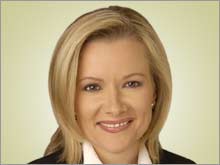3 problems with refis - and what you can doYou may want to lock in a low interest rate with a new mortgage, but getting one will take the right moves.(Money Magazine) -- When my husband and I took out a mortgage a few years ago, our mortgage broker assured us that no matter which product we chose, we didn't have to worry. If we decided we didn't like the loan in a few years, we could simply swap it for a new one. Nowadays a lot of borrowers with adjustable-rate and interest-only loans are facing rate resets and would love to swap out of trouble.
Mortgage Rates
But despite low interest rates and plenty of competition among lenders, would-be refinancers are finding it anything but easy to get new loans. Here's why. Problem: Hidden charges No doubt closing costs won't be a surprise if you already have a mortgage; fees for application, credit check, title policy, flood certification (if necessary) and the bank attorney can easily exceed $2,000. Overall, mortgage origination fees average 1.7% of the loan balance, with third-party fees adding another 1.1%, according to the Department of Housing and Urban Development. But watch out for this zinger: the prepayment penalty. Many people who took out loans in the past few years are on the hook for anywhere from 1% to 3% of the loan value when they refinance, says Bob Moulton, president of Americana Mortgage Group in Manhasset, N.Y. The penalty may phase out gradually, from 3% in the first year to 2% in the second and 1% in the third. What to do: Total up all the fees for a new loan, and you can see how the bill might wipe out the savings you get from a lower rate. Use the refinancing calculator at bankrate.com to determine if you'll come out ahead. If you won't, you may have to wait a year or two for your prepayment penalty to expire. ("Feds look to rein in 'liar loans'") Another check is to look at the APR, or annual percentage rate, when you shop. This is the effective interest rate you'll pay on your loan, rolling in one-time fees, and it's the critical number for comparing mortgage offers. Problem: Shrinking equity With every refinancing comes a new appraisal. If you live in a market where home prices are off sharply, you may find that your house appraises for less than you expected. Worse, you could find yourself owing more than your house is worth. (Latest home prices) What to do: John Bredemeyer, an appraiser and spokesman for the Appraisal Institute, suggests inspecting the bank's appraisal carefully. Does it correctly describe your property? Remember, some appraisers conduct inspections from the street, making it hard for them to see upgrades like a new kitchen or finished basement that have raised the value of your home. Problem: Steeper rates Lenders, now trying to steer clear of losses after a wave of subprime loan defaults, have tightened credit standards for all borrowers. Plus, notes mortgage broker Melissa Cohn of Manhattan Mortgage Co., banks have tacked on another eighth to a quarter of a percent to already rising mortgage rates to cover their risks. What to do: Find out what rate you qualify for before you apply for a loan. First buy your credit score from all three major bureaus for $15.95 at myfico.com. Then use the tool on the home page labeled "The higher your FICO score, the lower your payments" to see what rate someone with your credit score would likely pay and what your monthly payment would be. If the number is high, make sure your credit report doesn't contain errors that are dragging down your score. Chipping away at your credit-card debts will also help you refinance profitably. Today many lenders are penalizing you if your card balances eat up more than 35% of your available credit, compared with 50% in looser times. Make room for Mom: Having elderly parents move in takes more than putting extra towels in the bathroom. Here's how to make them comfortable - and safe. Rate woes: The latest hit to housing |
|

